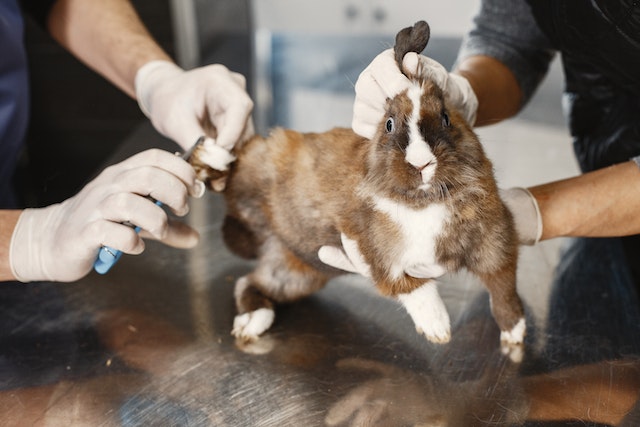Rabbits make cute and adorable small pets, but like human children they can take time and effort to ensure they’re living their best life with you. Watching a human have a seizure can be quite distressing, but watching a small furry family member have one can be much worse.

Is it possible what you saw was actually a seizure? And if so, what would cause your beloved bunny to have one? If they did have one, is there anything you can do to prevent it from happening again?
Here is some information for you to start your rabbit care research so you are prepared for when you book an appointment at the veterinary clinic.
Contents
- Record the Details
- What Exactly is a Seizure?
- What Would Cause a Rabbit to Have a Seizure?
- What Are Some Other Reasons for Rabbit Seizures?
- Infections That Can Cause Seizures
- Exposure to Toxins
- Rabbit Epilepsy
- Cancer or Tumours
- Rabies
- Blood Clots in the Arteries
- When Should I Call My Vet?
- What Kinds of Treatments Are Available?
- Do I Need to Book a Vet Appointment for My Rabbit?
Record the Details
It can be distressful watching your rabbit have what may be a seizure. But if the seizure passes, and he/she appears to be fine, then it may be an issue, but not as serious as you believe.

Write down all details onto a slip of paper, including date and time, and how long the seizure happened. Include what exactly happened during the seizure – did your rabbit twitch or shake with involuntary movements, and collapse? Did they pee or poop when it happened?
Was there any vomiting or blood? Did they fall unconscious, then regained consciousness after the seizures stopped? How frequently is this happening? Is it possible you saw it happen before but weren’t concerned, but now you are seeing it again you are? It can be tricky at times discerning if your rabbit is just being silly, if they really have a serious medication condition.
What Exactly is a Seizure?
Seizures can occur in rabbits, mammals, and humans. They are basically caused by sudden electrical activity in the brain that triggers the rapid uncontrollable movements.

They can involve major convulsions, or shaking or gentle twitching. The bigger episodes are generally called grand mal seizures. It may also be possible your rabbit is having seizures but you can’t tell.
You may also see your rabbit rolling, twitching, tilting their head, or having a paralyzed body part. The longer the seizure is, the more deadly it is. Your rabbit’s body temperature may increase. Shorter seizures will not cause any lingering side effects, while a five-minute seizure can be deadly.
What Would Cause a Rabbit to Have a Seizure?
Let’s begin with the most distressing incident ever, because if your rabbit survived the supposed seizure, chances are there is hope and your bunny can be put on medication to keep it from happening again.
The worst case scenario is when the liver or kidneys fail. This is a normal occurrence that happens to mammals as they age. Over time, the liver and kidneys fail to remove the harmful ammonia from the blood. Over time, this builds up and can affect the brain.

Finally, the brain will shut down, causing a seizure. The heart will fight to keep the body alive, hence the sharp uncontrollable movements made by the animal. Early on, the animal will fall into unconsciousness so they won’t be distressed by the seizure. Finally, they will pass away.
But this is the worst-case scenario. If your rabbit is still conscious during and after their seizure, then there is hope! The seizure may have been caused by something else that is fully treatable.
What Are Some Other Reasons for Rabbit Seizures?
Besides the kidney or liver diseases listed above, seizures can be caused by heart problems, brain injuries, and neurological disorders. If your rabbit has outdoor access, then may also have been poisoned, or eaten something they should not have eaten.

Are you inviting guests over? Instruct them and younger children to never feed the rabbit human food! Let’s go through the possible issues below. Try not to stress, as you will be bringing them to the vet clinic and getting help for them soon.
Infections That Can Cause Seizures
Infections can cause seizures in rabbits. These are most commonly related to inner ear infections, or E. cuniculi infections, which is a type of protozoan. Fortunately, there are antibiotics to treat these conditions, and once that is done your rabbit will make a full recovery. It is important to book that vet appointment ASAP though.
Exposure to Toxins

Since rabbits are so small, they are more sensitive to toxins, which includes toxins from drugs, food, plants, or other chemicals. Prevention is better than trying to treat the rabbit after exposure. Never give medication or drugs to a rabbit without consulting a veterinarian.
Only clean your rabbit’s habitat or your floors (if you let your bunny out), with vinegar and water, never household cleansers. Keep all plants out of the way of the rabbit. Only give rabbits foods that are safe for them to eat (never chocolate, alcohol, coffee, etc.). Set up a safe space outdoors where they can run around and munch on grass or carrots. Ensure that wildlife can’t get inside their enclosure.
Rabbit Epilepsy
All mammals can suffer from epilepsy, which is a disorder of the brain. This may be a common occurrence from birth, but can occur after a bad head trauma injury too. It’s not entirely understood what epilepsy is. It is often inherited from a parent. There is a good chance the rabbit will recover if they had a brain trauma injury, but also important that you make their environment safer so they don’t fall down again.
Cancer or Tumours
Cancer or tumours in rabbits can cause seizures but it’s more of a rare condition. In the case of cancer, if your rabbit was undergoing chemotherapy treatment, the medication used can cause seizures in the brain.
The other condition is when there are cancerous tumours that are growing inside the brain that can lead to seizures. If your rabbit doesn’t have cancer, then this is unlikely the cause of your rabbit’s seizures.
Rabies
Most pet rabbits are immunized against rabies at an early age so you’ll never have to worry if they get bitten by an infected animal. But if you have recently rescued an outdoor rabbit and they are suffering from seizures, infection with rabies is one possible cause.
For this reason, you should take care when handling rescued rabbits, and take them to the vet immediately for vaccination. Unfortunately, by the time your rabbit has rabies it’s too late and euthanasia is the best option.
Blood Clots in the Arteries
Bad blood clots in the arteries can cause a variety of issues, and are more serious when they are present in the brain and more commonly called strokes. This condition can affect all mammals, including rabbits.
Blood clots can cause seizures, along with losing limb function, or inability to move one side of the body. This is a serious condition and the rabbit must be taken to the vet immediately. The good news is that blood thinner medication is often effective for this condition, so if you act quickly. you can extend the life of your rabbit.
When Should I Call My Vet?
If your rabbit has a long seizure of over five minutes, we recommend an emergency vet visit now. If your rabbit is occasionally twitching, do book that visit within a week. Be sure to record all details. If your rabbit is having one seizure or more per day, get him/her to the vet immediately.
What Kinds of Treatments Are Available?
The main type of treatment to prevent further seizures in rabbits is generally medication. But it will depend on what is the exact cause of the seizures is. If your bunny is in their senior years, the medication will be ongoing. If your rabbit was exposed to poison or the wrong food, then it’s possible they will fully recovery and only need medication on a temporary basis.
Do I Need to Book a Vet Appointment for My Rabbit?
If you believe your rabbit had a seizure, or is still getting them, we highly recommend that you book an immediate appointment with your local veterinary clinic or animal hospital. Not only will you gain answers as to why it is happening, the vet will prescribe medication to prevent it from happening again.
And it may not be the happy answers you’re seeking, but it’s best to be prepared so you can take some photos for your bunny’s scrapbook. During the vet visit they will examine your rabbit, and recommend blood tests.
It can be distressing to see your rabbit suffer a seizure, whether it’s minor twitching or a major event. The sooner your bring your rabbit to a vet clinic for a proper diagnosis, the sooner you can get some answers as to whether they’re really getting seizures, and if not, what other health condition can cause twitching and jerking of the muscles?
From there, the veterinarian will suggest a good treatment plan that includes medication. Both you and your bunny will feel much happier once you understand what is happening and how to treat the condition.





